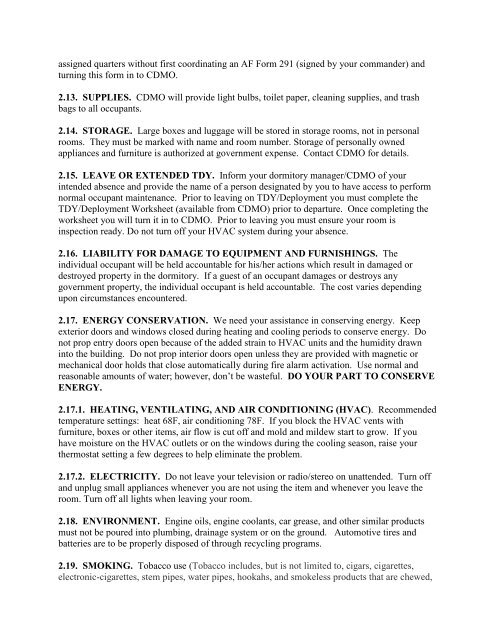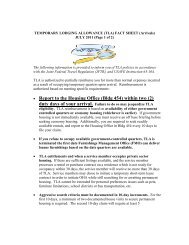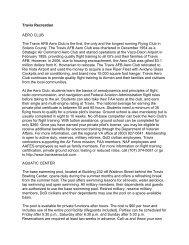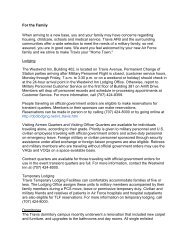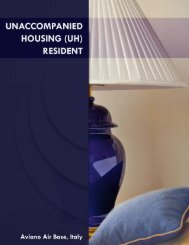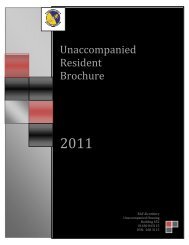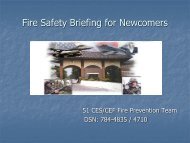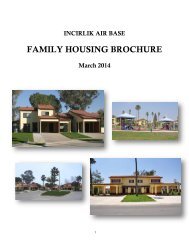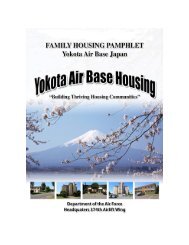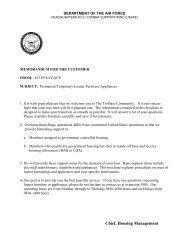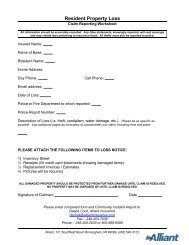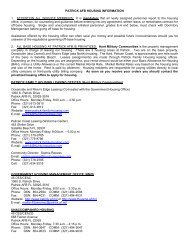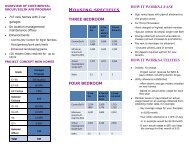Unaccompanied Housing Brochure - Air Force Housing
Unaccompanied Housing Brochure - Air Force Housing
Unaccompanied Housing Brochure - Air Force Housing
Create successful ePaper yourself
Turn your PDF publications into a flip-book with our unique Google optimized e-Paper software.
assigned quarters without first coordinating an AF Form 291 (signed by your commander) and<br />
turning this form in to CDMO.<br />
2.13. SUPPLIES. CDMO will provide light bulbs, toilet paper, cleaning supplies, and trash<br />
bags to all occupants.<br />
2.14. STORAGE. Large boxes and luggage will be stored in storage rooms, not in personal<br />
rooms. They must be marked with name and room number. Storage of personally owned<br />
appliances and furniture is authorized at government expense. Contact CDMO for details.<br />
2.15. LEAVE OR EXTENDED TDY. Inform your dormitory manager/CDMO of your<br />
intended absence and provide the name of a person designated by you to have access to perform<br />
normal occupant maintenance. Prior to leaving on TDY/Deployment you must complete the<br />
TDY/Deployment Worksheet (available from CDMO) prior to departure. Once completing the<br />
worksheet you will turn it in to CDMO. Prior to leaving you must ensure your room is<br />
inspection ready. Do not turn off your HVAC system during your absence.<br />
2.16. LIABILITY FOR DAMAGE TO EQUIPMENT AND FURNISHINGS. The<br />
individual occupant will be held accountable for his/her actions which result in damaged or<br />
destroyed property in the dormitory. If a guest of an occupant damages or destroys any<br />
government property, the individual occupant is held accountable. The cost varies depending<br />
upon circumstances encountered.<br />
2.17. ENERGY CONSERVATION. We need your assistance in conserving energy. Keep<br />
exterior doors and windows closed during heating and cooling periods to conserve energy. Do<br />
not prop entry doors open because of the added strain to HVAC units and the humidity drawn<br />
into the building. Do not prop interior doors open unless they are provided with magnetic or<br />
mechanical door holds that close automatically during fire alarm activation. Use normal and<br />
reasonable amounts of water; however, don’t be wasteful. DO YOUR PART TO CONSERVE<br />
ENERGY.<br />
2.17.1. HEATING, VENTILATING, AND AIR CONDITIONING (HVAC). Recommended<br />
temperature settings: heat 68F, air conditioning 78F. If you block the HVAC vents with<br />
furniture, boxes or other items, air flow is cut off and mold and mildew start to grow. If you<br />
have moisture on the HVAC outlets or on the windows during the cooling season, raise your<br />
thermostat setting a few degrees to help eliminate the problem.<br />
2.17.2. ELECTRICITY. Do not leave your television or radio/stereo on unattended. Turn off<br />
and unplug small appliances whenever you are not using the item and whenever you leave the<br />
room. Turn off all lights when leaving your room.<br />
2.18. ENVIRONMENT. Engine oils, engine coolants, car grease, and other similar products<br />
must not be poured into plumbing, drainage system or on the ground. Automotive tires and<br />
batteries are to be properly disposed of through recycling programs.<br />
2.19. SMOKING. Tobacco use (Tobacco includes, but is not limited to, cigars, cigarettes,<br />
electronic-cigarettes, stem pipes, water pipes, hookahs, and smokeless products that are chewed,


